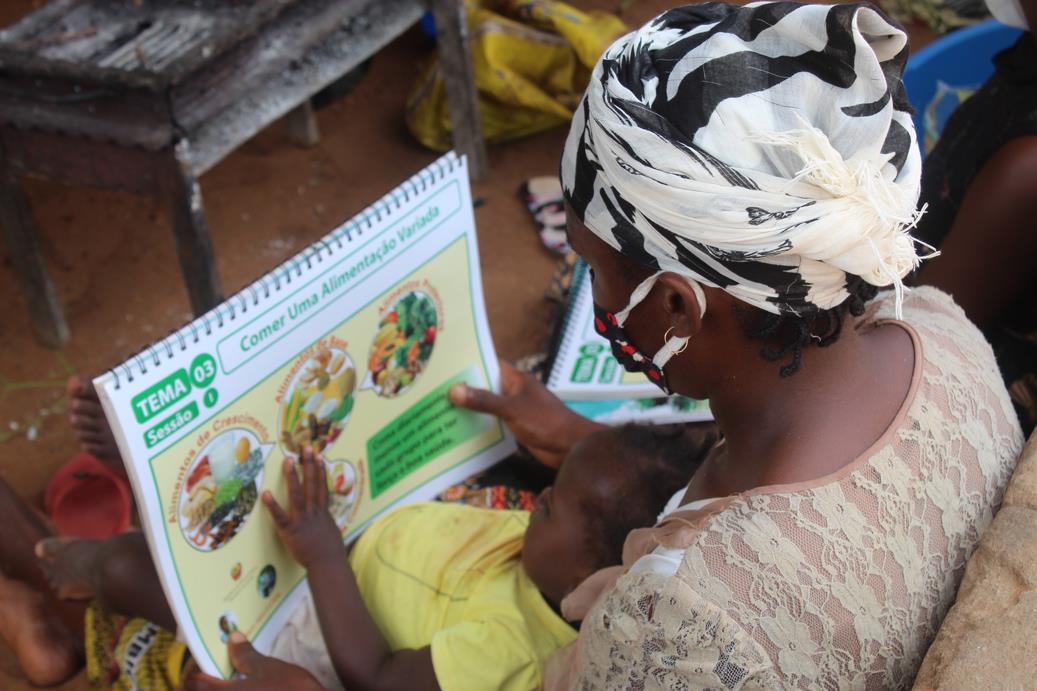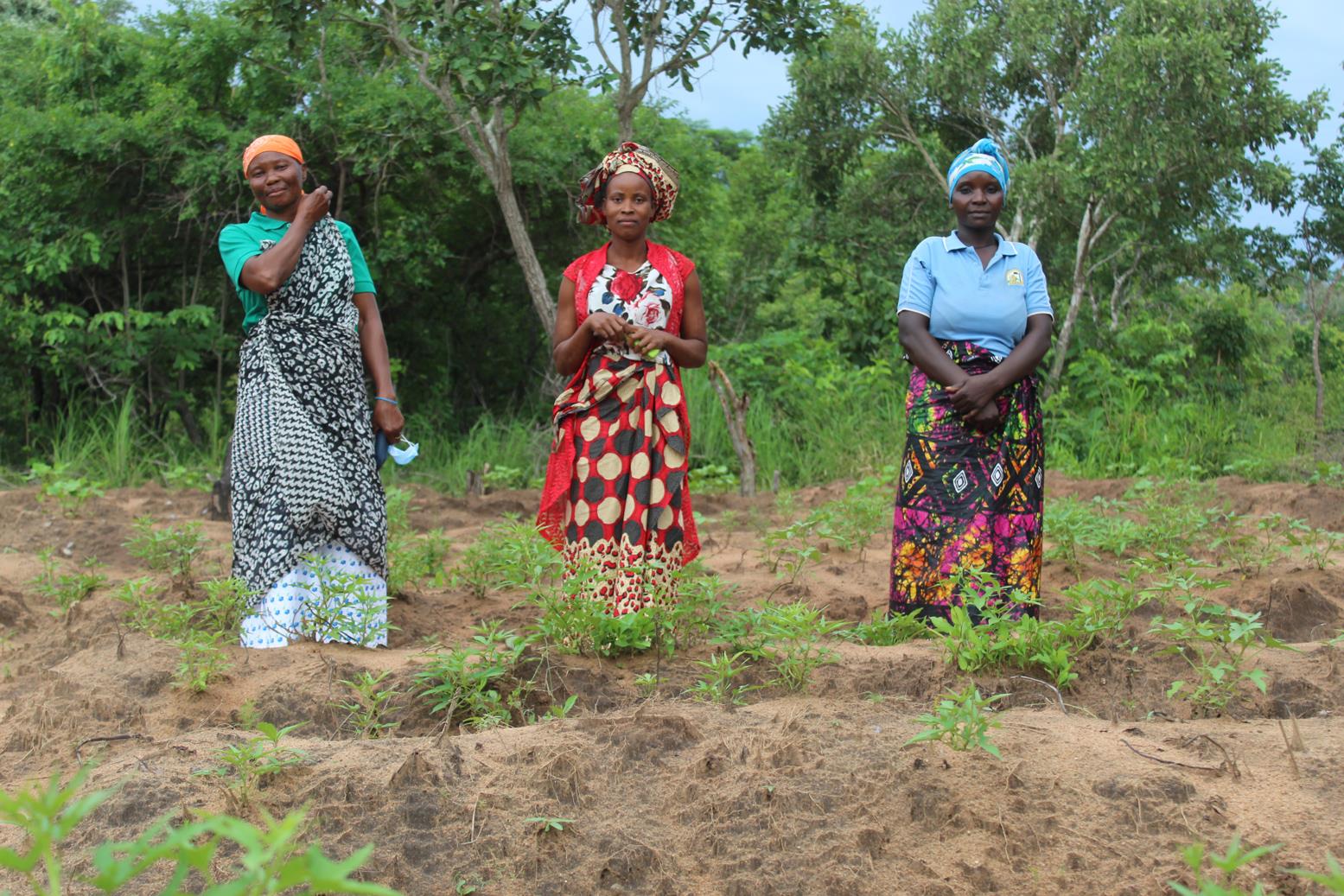
Enriched porridges and nutrition knowledge keep children healthy in Mozambique
Education and training are reducing the malnutrition rates in Cabo Delgado
The province of Cabo Delgado in Mozambique has the country’s highest malnutrition rates in children under 5 years. With knowledge from an FAO training, Cristina teaches other women about healthy eating habits, appropriate meals for children and better practices for food preparation. ©FAO/Telcinia Nhantumbo
21/12/2021
Enriched porridge. What a powerful tool it became for the women of Katapua village in Mozambique’s Cabo Delgado province.
Cristina Celestino Mariano is a young mother with two daughters. She was trained as a “Care Mother” by an FAO Emergency programme on nutrition, funded by the Foreign, Commonwealth and Development Office of the United Kingdom.
After the training, Cristina was asked to teach her own group and that same day she walked around the neighborhood looking for mothers of children from 0-5 years old and pregnant and lactating women to join the programme. She formed a group of 10 women to start learning about nutrition. Cristina said that it was not easy to convince them, but she had the courage and necessary conviction to get them on board.
Once a week, she sits with her group and uses the specially designed flip charts to teach them about healthy eating habits and appropriate meals for children.
“In the flip charts we find illustrations of children with a big belly (odema) and that happens a lot in our region. There are many who suffer from it, but we believe that with this programme we are saving children. We have already learned to prepare the enriched porridges that combine flour with moringa, salt, peanut butter, and we also learned how to prepare the porridge with egg and sugar,” explains Cristina.


Through an FAO Emergency Programme, groups of women are getting nutrition education, empowering them to make dietary changes for themselves and their families. ©FAO/Telcinia Nhantumbo
The province of Cabo Delgado has the highest malnutrition rates in children under 5 years in Mozambique, and the situation in this area has worsened in recent years due to Cyclone Kenneth in April 2019, intensification of Non-State Armed Group attacks in the northern districts of Cabo Delgado between January and August 2021 and COVID-19.
Under the FAO Emergency Programme on nutrition, groups of women are empowered to take their nutrition into their own hands and pass this knowledge on to other women in their communities. They are learning better practices for food preparation and are participating in cooking sessions using locally available foods.
Cristina and other women additionally learned about the importance of hygiene practices.
“Even if we cook good food, without hygiene, children do not grow well. Before, I didn't wash the vegetables. Now I take my vegetables, wash them first and cut them to cook. The water that we are drinking has to be well covered… we always have to wash our hands with soap or ash,” she conveys.
Gardens boost nutrition
With vegetable seeds and agricultural tools distributed through the project, Cristina, as well as the other care mothers, are implementing home gardens, producing their own food to prepare more nutritious meals. This was the first time that she had a vegetable garden. “It was not easy. I didn’t know how to do it, but as I like to learn, I learned and now I teach the others,” she concluded.
“We had some mothers who knew how to make vegetable gardens, but they didn’t know that the garden could be made inside the yard. They had the idea that the garden could only be prepared in the vicinity of a water source away from home, but we said no, the garden can be made inside your homestead,” comments Abudo Amisse Valeriano, who was trained by FAO as a “promoter” for the programme, learning about nutrition and then passing it onto care mothers.
“We explained that to make the plots first, it has to be organized, and the seeds cannot be thrown in any way. It has to be in a beautiful line,” explained the promoter.

With tools distributed through the project, Cristina, as well as the other care mothers, are implementing home gardens and producing their own food to prepare more nutritious meals. ©FAO/Telcinia Nhantumbo
Nutrition in diversity
The Care mothers now have a new take on nutrition. “Eating well does not mean you have to eat the same thing every day. If we have chicken today, we can have matapa (cassava leaves) tomorrow. If it weren't for this programme, we wouldn't know a lot of these things,” adds Cristina.
“Now, I usually prepare something in the morning, in the afternoon something else, and at night something else to vary the food,” added Abiba Minate, another mother living in the Natuco village.
Ali Ali, the husband of Abiba, says that his wife eagerly imparts and practices what she learned.
“She is preparing enriched porridge for the children. Every time she goes to have nutritional education sessions, she says something about what she learned that day. And now she is practicing food variation and hygiene practices,” he said.
“What we learn does not end today, we will keep it in our houses,” concludes Cristina.
Since the start of this FAO project, 6 000 women have joined the nutritional education sessions. In a short time, these sessions and home gardens have improved the households’ dietary diversity, helping reduce malnutrition in the community.
Related links
Learn more
- Website: FAO country profile: Mozambique
- Website: FAO in emergencies
- Website: KORE - Knowledge Sharing Platform on Resilience

